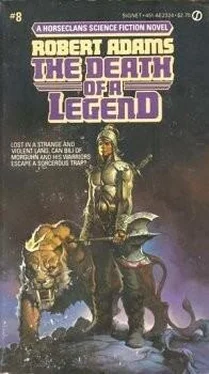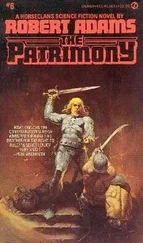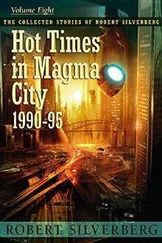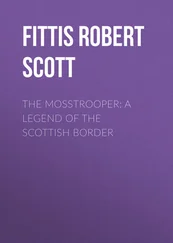Below a narrow nose slightly canted to the right by some old blow, his pale, thin lips frowned above a strong, square chin, and his face was now abristle with a two-day growth of dusty blond beard. Gneedos, though he liked and deeply respected Bili, could not say that he considered the young Chief of Morguhn a handsome man.
“But” he chuckled to himself, “women obviously do. Well, at least one woman does. All the army at Morguhnpolis, on the march up to Vawnpolis and then during that bastardly siege, knew him to be the chosen lover of the High Lady Al-dora, and she could’ve had any man in the host at a mere snap of her fingers.”
Unbeknownst to Gneedos, Bili too was just then doing some personal reflecting. “Sun and Wind, but this is a pretty pickle we’re in here.” As he often did when worried or troubled, he absently rubbed his thumb along a puckered scar on the right side of his thick neck. “When I was summoned from Harzburk—was it only a year ago? less even than that?—I rode south wondering how I’d keep from dying of sheer boredom as chief of a peaceful duchy for the rest of my life.
“Peaceful, hah! One, maybe two nights of rest I got, ere my mothers were filling my ears with the plots and counterplots and festering rebellion among the Ehleenee. And ere I’d been in my duchy a week, those priest-ridden whorespawn had made to ambush me and my party in Horse County, and a chancy thing that was, too.
“Wind be praised for Geros Lahvoheetos. Had he not fought his way back to Horse Hall—probably,” he grinned to himself, “knowing him, leaving a trail of piss all the way— I’d’ve been cold meat that night.
“Then I and the loyal nobles and poor old Pawl Raikuh’s Freefighters had to hack our way out of my own damned capital city, only to find ourselves besieged by an army of peasants and gutter scrapings, led by a gaggle of bloodthirsty priests and a madman and pervert. And when once the High Lord is out of Morguhn and Vawn, I still mean to see that buggering bastard Myros of Deskahti, madman or no, impaled. It’s a debt I owe to my brother Djef, and to all the other brave men who’ve gone to Wind because of him and his ilk.
“But before he died, Djef and the men he led out on that nighttime sally surely blooded the swine.” A grim smile flitted across his face as he thought of how the besiegers’ transport and stores and siege engines had blazed on that dark night and of how the ill-led and thoroughly confused rabble had spent most of the hours of darkness fighting each other under the impression that their dimly seen opponents were Bili’s men.
So badly had the besiegers been demoralized and decimated that, upon receipt of word that Confederation cavalry was on the march from the north, the secular commander and his staff had fled back to the supposed haven of the walled city of Morguhnpolis, taking the senior ecclesiastic with them but leaving the common priests and all their remaining forces, as well as their wounded officers and men, to the tender mercies of the blood-mad garrison of Morguhn Hall.
And, heedless alike of his still-unhealed wounds from the ambush and of the well-meant advice of an older man who was both his cousin and a retired general of the Confederation, Bili had mounted his scratch force of less than a hundred men and ridden out in hot pursuit of the retreating thousands. And it had been a butchery; most of the self-styled “crusaders” had thrown aside their weapons and sketchy armor to facilitate their flight, and precious few of those who still were armed put up any sort of resistance when finally they were ridden down. But Bili had been fostered, reared and trained in a hard school by a pitiless ruler, and he saw the murderous hunt on to the very walls of Morguhnpolis, he and his men slaying the screaming, running, unarmed would-be rebels until all—both men and horses—were as blood-splashed as autumn hog butchers, until swords and sabers and axes and spears were all dull-edged and clotted all over with sticky gore, until scarcely an arrow or a dart remained unused and both men and beasts trembled with weariness.
Knowing that the city could not be held against the oncoming regulars of the Army of the Confederation and unwilling to tie down their few effectives in an open fight with Bili and his retainers, the surviving rebels within Morguhnpolis had first securely baiTed all four gates from within, then fled the city by secret ways. Nor did they stop until they were completely out of the Duchy of Morguhn and safely within the neighboring Duchy of Vawn, wherein a similar rebellion had succeeded.
One of the rebellious nobles of Morguhn had been the younger brother of Komees Hari Daiviz—a man of above fifty years, owning no known mindspeak ability, no arms training other than the normal basics learned in their youth by gentlemen and no military experience. This Drehkos Daiviz of Morguhn held the minor title of vahrohneeskos, which had been part of his patrimony, but he owned no trade or profession to occupy him, and after the death of his wealthy wife he had drifted into the clandestine rebellion mostly out of boredom.
However, before the rebels had fled Morguhnpolis, the senior secular commander, Vahrohnos Myros, had suffered some type of seizure and had lapsed into a coma, whereupon all had looked to Drehkos to command. With the direct escape route to the southwest clogged by a vast horde of fleeing peasants and city commoners, Drehkos had perforce led his mounted party north, into the Duchy of Skaht, and then west, into the mountains of the savage, headhunting Ahrmehnee.
Doing only what he sensed was best and with no scintilla of military training or experience to guide him, Drehkos had led his ill-armed and ill-supplied force southwestward in a weeks-long running fight with the cunning Ahrmehnee. He had been racked with sorrow and regret that he had left a good third of his initial numbers dead or missing in those mountains, but those who knew better had all quickly hailed him a military genius to have emerged with such small losses. Moreover, the rebel nobles of Vawn had insisted that a man of such sagacity and prowess was far better fitted to lead and command the rebel forces now concentrated in and about the walled city of Vawnpolis than were any of them. “If only the Ahrmehnee had managed to take the head of that treacherous dog of a Drehkos,” thought the young thoheeks, “the campaign would’ve been concluded last summer and at far less cost, too.”
An ancestor of the murdered thoheeks and Chief of Vawn had collected during his time some half-dozen tomes having to do with various aspects of warfare. That Drehkos had chanced upon these dusty books had been pure luck—good for him and the rebels, bad for his opponents; indeed, fatal for many. His careful reading and rereading of the small col-lection had been of immense aid to him in strengthening the existing defenses of the city, in adding new innovations and in harrying the aimy marching up from Morguhn toward Vawnpolis.
With the two largest cities of the duchy—Morguhnpolis and Kehnooryos Deskahti—back in loyal hands and with the smaller towns and the countryside of Morguhn being purged—bloodily purged—of rebels and rebel sympathizers by Bili and his fast-moving column, augmented by troops of Confederation cavalry, High Lord Milo’s summons had brought in armed and mounted nobles from leagues around, thousands of unemployed Freefighters from the Middle Kingdoms north of the Confederation, herds of remounts and draft or pack animals, mountains of supplies and gear and wheeled transport. Then, with all of Morguhn secure and garrisoned, the army—Confederation regulars, Freefighters and heavily armed nobility—had commenced a march upcountry, with Vawnpolis as their goal.
But Drehkos, armed with his new ars militaris, had made that march much longer in time and far and away more expensive in supplies stolen or destroyed and in blood spilled and lives lost than his meager forces had had any right to do. His bitter price for the leagues the invading force gained had been mostly exacted in hit-and-run raids, harassment of the supply lines and cutting off of stragglers; but on two singular occasions, he had struck openly, hard and in force.
Читать дальше












